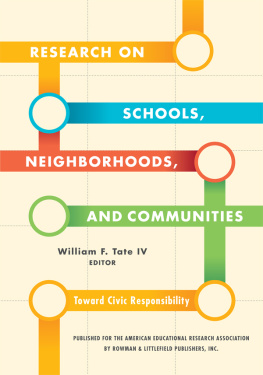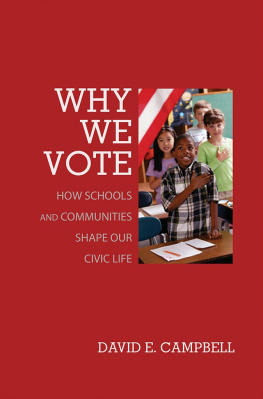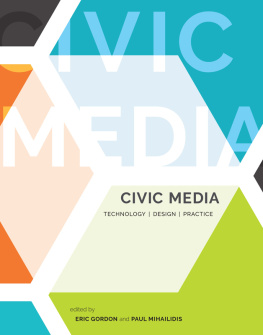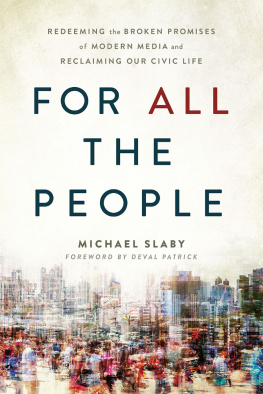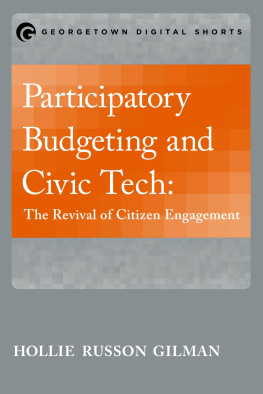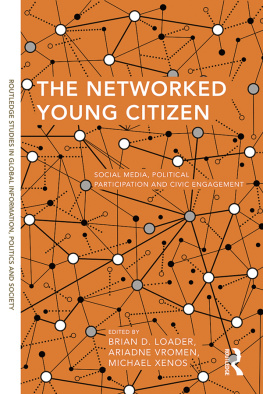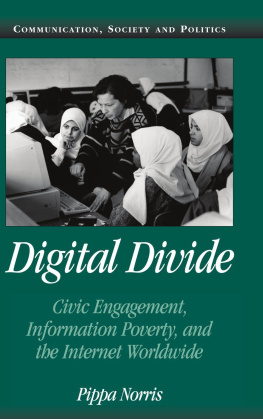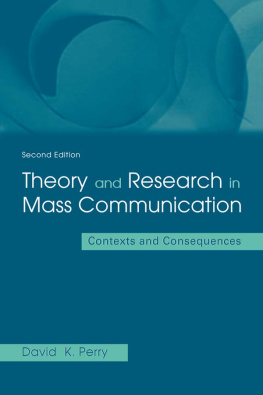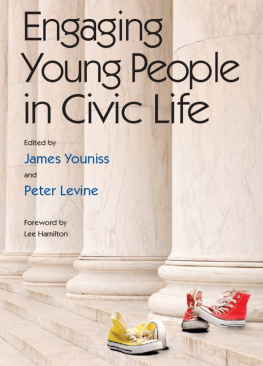
Civic Media Literacies
Civic life today is mediated. Communities small and large are now using connective platforms to share information, engage in local issues, facilitate vibrant debate, and advocate for social causes. In this timely book, Paul Mihailidis explores the texture of daily engagement in civic life, and the resourceshuman, technological, and practicalthat citizens employ when engaging in civic actions for positive social impact. In addition to examining the daily civic actions that are embedded in media and digital literacies and human connectedness, Mihailidis outlines a model for empowering young citizens to use media to meaningfully engage in daily life.
Paul Mihailidis is an associate professor of civic media and journalism in the School of Communication at Emerson College in Boston, MA, USA, where he teaches media literacy, civic media, and community activism. He is founding program director of the MA in Civic Media: Art and Practice, Principle Investigator at the Emerson Engagement Lab, and faculty chair and director of the Salzburg Academy on Media and Global Change. His research focuses on the nexus of media, education, and civic participation in daily life. His work has been featured in the New York Times, the Washington Post, Slate magazine, the Nieman Foundation, USA Today, CNN, and others. Mihailidis holds a visiting professorship at Bournemouth University in England. He co-edits the Journal of Media Literacy Education and sits on the advisory board for iCivics. He earned his PhD from the Phillip Merrill College of Journalism at the University of Maryland, College Park, USA.
Civic Media Literacies
Re-Imagining Human Connection in an Age of Digital Abundance
Paul Mihailidis
First published 2019
by Routledge
711 Third Avenue, New York, NY 10017
and by Routledge
2 Park Square, Milton Park, Abingdon, Oxon OX14 4RN
Routledge is an imprint of the Taylor & Francis Group, an informa business
2019 Taylor & Francis
The right of Paul Mihailidis to be identified as the author of this work has been asserted by him in accordance with sections 77 and 78 of the Copyright, Designs and Patents Act 1988.
The Open Access version of this book, available at www.taylorfrancis.com, has been made available under a Creative Commons Attribution-Non Commercial-No Derivatives 4.0 license.
Trademark notice: Product or corporate names may be trademarks or registered trademarks, and are used only for identification and explanation without intent to infringe.
Library of Congress Cataloging-in-Publication Data
A catalog record for this book has been requested
ISBN: 978-1-138-69581-8 (hbk)
ISBN: 978-1-138-69582-5 (pbk)
ISBN: 978-1-315-52605-8 (ebk)
Typeset in Bembo
by Apex CoVantage, LLC
To Amy Twohig Mihailidis. Whose commitment to her community, and family, reflect the selflessness needed to embrace positive social change in the world.
To Emma, Mae, and Will. Whose smiles guide the aspirations for what this book hopes to achieve.
To Valerie Diggs. A pioneer in her field and in life. Whose story launched the inspiration for this book.
To all the everyday activists who work tirelessly and without accolades to improve life for their communities in the most important ways.
The research for this book occurred during a tumultuous time. An unprecedented rise of populist, nationalist, and extremist movements have impacted democracies around the world. Over a decade ago, citizenries began to rebel against long-standing autocracies and dictatorships in the Middle East, culminating in a ravaging civil war in Syria, and exacerbated by mass refugee resettlements across Europe, the Middle East, and North America. A number of political, social, and economic variables contributed to these uprisings and the resulting shakeup of global democratic norms. But one thing that seems to be constant across all cases of civil unrest is the role that social networks and digital technologies play in the organization of the uprisings, providing loose networks for information flow, and showing the world that populations were taking action in support of social change.
Of course, technologies alone do not cause civic uprisings. In fact, they may be as much to blame for the re-emergence into power of new authoritarian regimes, who have found ways to leverage internet connectivity and social networks for extensive monitoring of populations and overt control of communication infrastructures.1 A number of books and studies released in recent years have explored the range of ways in which media technologies have impacted how citizens engage with (or disengage from) civic society in times of unrest and protest.2 Although these texts dominate academic and mainstream social discourses about and potential influences of technologies in recent political and social shifts, there is another side of technologys impact on civic life.
Between and beyond explorations of national politicians, refugee crises, the dark web, and fake news, there exists a groundswell of innovative and dynamic small-scale and hyper-local initiatives that have leveraged technologies to impact positive social change in the world. These initiatives, a few of which I highlight in this book, show that people of all ages are employing technologies to solve problems and bring about change in their communities. They are embracing platforms that allow them to advocate for changes that they are personally motivated to see happen. The tools employed for participation seem secondary to their motivations and inspiration.
This lesson was directly imparted on me in 2014, while I was engaged in advocacy efforts to support laid-off educators in Chelmsford, Massachusetts. Over a four-month period, I began to see firsthand through conversation and feedback why people choose to participate and, more importantly, why they choose to stop participating. I also became acutely aware of how social media and connective networks could incite, exaggerate, and implicate, with little more than a few sentences, a post or an image. Over time, it became increasingly clear that I had been building media literacy practices and pedagogies backward.
In my classrooms, focusing on flashy topics, current trends, and big picture issues brought strong teaching reviews, lots of aha moments for students, and real implicit connection to the techniques that media messages use to engage. Teaching about access to information in an age of big data, media ownership, Facebook and Google advertising platforms, and mobile phones, led to what I believe was strong knowledge transfer for my students. Pedagogically, students were experimenting, reflecting, understanding, and creating. In classrooms and communities, we started with questions such as Why does this matter? What is important about this to me? To my community? Although these approaches were, and still are, invaluable to media literacy pedagogy and practice, my experiences showed that civic impact was always anecdotal and rarely achieved as an outcome of media literacy practice. Although I was imparting valuable knowledge to help prepare students for lives of meaningful engagement, this knowledge wasnt connecting to any real sense of why this information matters not only to them, but also to the people, communities, systems, and structures that they rely on beyond the walls of the classroom.


